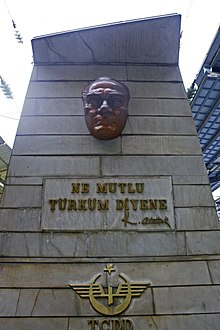Ne mutlu Türküm diyene
Ne mutlu Türküm diyene ( Turkish for "happy he who calls himself a Turk") is a motto of Ataturk , whichis widely usedin Turkey to this day. The entire wording was used in Turkish schools from 1933 to 2013. After the national anthem wassung every morningbefore class, this text was read as an oath by a boy or a girl and repeated by all the other students.
Full wording
The full wording is:
- “Türküm, doğruyum, çalışkanım. İlkem, küçüklerimi korumak, büyüklerimi saymak, yurdumu, milletimi, özümden çok sevmektir. Ülküm, yükselmek, ileri gitmektir. Hey büyük Ataturk! Açtığın yolda, gösterdiğin hedefe durmadan yürüyeceğime ant içerim. Varlığım Türk varlığına armağan olsun. Ne mutlu Türküm diyene! "
Translated into German this means:
- “I am Turkish, honest and hardworking. My law is to protect my younger ones, to respect my elders, to love my homeland and my nation more than myself. My ideal is to ascend, to move forward. O great Ataturk! I swear that I will strive unstoppably on the path opened by you to the goal shown by you. My existence should be a gift to the Turkish existence. How happy the one who says 'I am a Turk'! "
Interpretations and translations
The official interpretation of the sentence relates exclusively to citizenship . Happy is he who calls himself a Turk, and who does not Turk is . This should also include citizens of other origins. However, state practice often resulted in denying the existence of minority ethnic groups .
